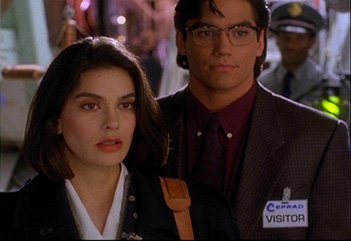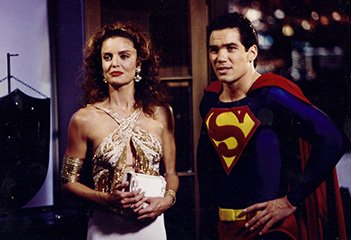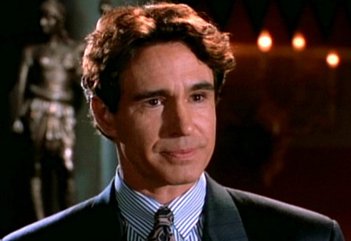Metropolitan Masterstroke: “Lois & Clark” is the best version of Superman ever
There are a lot of superheroes right now. There are nine big comic book releases lined up for 2016 alone and that’s not even counting the tidal wave of new TV shows being commissioned based on various superhero properties. For comic fans this is a Golden Age (if you don’t mind), for others, it’s everything from a creative nadir to the destruction of culture as we know it. Either way, a lot of people are a little bit overwhelmed and it’s not hard to forget why these characters were so endearing to begin with.

Saturdays on RTE 2 (then Network 2) at 7pm was when the world made sense. It was during this timeslot that I was introduced to one of the most formative experiences a 4-year-old can have – my first exposure to the world of Superman. You know the basics, he can fly, he can move incredibly fast, he doesn’t need a gun because he’s so strong he can crush them with his bare hands, mild-mannered news reporter, he can fly.
But I’m not going to bore you with the basics, you’ve probably seen the Superman films (all of which are brilliant and terrible, some leaning to one of those words more than others). You may have watched the 90s cartoon (fun but not as good as the Batman one). God knows, you may have even hazarded a glance at a Superman comic book. You may have done all or none of these things, but if you’re like a lot of people you’ve probably already made up your mind about the Man of Steel – he’s too ‘powerful’ because he can do ‘anything’. Setting aside that particular brand of ridiculousness, let’s discuss Saturday evenings on Network 2 again for a moment.
Lois & Clark: The New Adventures of Superman starred Dean Cain and Teri Hatcher (Susan from Desperate Housewives) as the eponymous reporters Lois Lane and Clark Kent. Lane is a seasoned pro, a tough-as-nails journalist who refuses to sleep her way to the top and who has been jaded too many times by opportunists to trust anyone. Kent is a fresh-faced farmboy straight off the boat from a globe-trotting trip where he built up credentials as a newspaper reporter. The two see the world very differently – Lois believes everyone has an agenda, Clark believes people are inherently good. Both are obviously attracted to one another and neither would dare to act on this, more so out of pride and fear of being the first one to let their guard down than out of any actual fear of rejection. Ultimately, both are simply hard-working professionals trying to make their name in the world of journalism. Clark also happens to be a supremely powerful alien from the doomed planet, Krypton.

In previous versions of Superman, there’s never much of an explanation given as to why Clark became a journalist, beyond the assumption that it’s a line of work that would let him know when trouble is taking place and allow him to duck out at a moment’s notice. Here, it’s quite simple – he just wants to have a normal life in the big city, in a career he’s passionate about. His superhuman abilities and the inherent good instilled in him by his adoptive parents, (the level-headed Jonathan and the post-hippy artiste Martha) mean that he can’t simply stand around while people are in danger, but similarly he won’t jeopardise his chance at that normal life. With the help of his parents (and an amazingly 1990s ‘costume-making’ montage to Bonnie Tyler’s “Holding out for a Hero”) he creates the guise of Superman, as a means of allowing him the best of both worlds (and yes, the glasses-as-a-disguise require spoonfuls of suspension of disbelief, but I maintain that they do change the shape of his face somewhat). The series follows Clark as his relationship with Lois grows from professional courtesy to friendship and eventually into an uneasy romance, tempered by his dual identity as Superman and the best efforts of the suave industrialist/evil overlord Lex Luthor (a positively Shakespearean John Shea; there’s an episode where he stares down a snake). Along the way, Lois begins to learn from him that the world might be brighter than it seems while Clark learns not to let his naivety get the better of him.
As good as Christopher Reeve was in the movies, Marlon Brando’s floating head basically tells him that he must become space Jesus. The exact same thing happened in Man of Steel only this time with Russell Crowe and even more grating Christian symbolism. In both films, the Superman costume is just sitting there in the Fortress of Solitude (seriously, that’s what it’s called), presumably made by Kryptonian Space Lasers for some diplomatic purpose that is never alluded to in the plot. In Lois & Clark, when a young girl in a wheelchair tells Superman that she likes his costume, he thanks her and proudly tells her that his mother made it for him, simple and perfect. One of the advantages the series has is that it’s one of the only examples outside of the comics whereby Clark actually comes up with the idea of Superman himself. Very much unaware of his origins, his purpose on Earth or any kind of destiny that his biological parents may have had in mind for him, he creates an agency and a purpose for himself based on a strong upbringing and a cultured exploration of the world around him. But while Clark is undoubtedly a really nice, hard-working guy, it’s his relationship with Lois that unknowingly transforms Superman from a struggling vigilante into a champion fighting a never-ending battle for truth and justice. The loyalty, friendship and ultimately the love she shows for him helps him to grow and have more faith in his own abilities (and eventually his heritage), rather than just being amazing at everything from the outset. In the inevitable ‘alternate reality’ episode, Lois enters a dystopian world where she died years ago and Clark never dared to become Superman at all, leaving her to ‘create’ the legend from scratch. It’s an approach that was later applied to the risible teen drama Smallville and to some extent in Man of Steel, but it’s accomplished best here.

Nobody in the world is going to pretend like Lois & Clark is some forgotten fantasy masterstroke that deserves to be celebrated in the same way as Buffy The Vampire Slayer, The X Files or Star Trek The Next Generation. It suffered the same pitfalls of many adventure series in the 1990s: it started out with grand aspirations of maturity before ultimately descending into the trappings of a Family show, many of its episodes were cripplingly standalone (there are some great story arcs in all four seasons however) and either by coincidence or design, there needed to be a lot more elements from the source material. Some of the special effects leave a lot to be desired as well (“You will occasionally believe that a man can fly!”). But it has a heart and a comedic warmth to it missing from many modern iterations of the character and indeed many modern superheroes in general. The chemistry between Dean Cain and Teri Hatcher (who remains the best Lois Lane of all time) is unrivalled by any modern big-budget romance and Lane Smith as the crusty old editor Perry White is one of the most under-rated comic relief TV characters of all time (“I love the smell of fear in a newsroom!”).
People complain that in scenes of violence and destruction between Superman and this or that monster-supervillain that there’s no tension because Superman is so incredibly powerful that he’s certain to succeed. Whether or not that’s true when speaking about a fictional character who need only be as powerful as the writer says he is, a series like Lois & Clark actually has the advantage here – as a weekly TV series it didn’t have the budgets to show world-beating supervillains from week to week, meaning that the stories were usually more detective-oriented, with Superman’s strength only coming into play in the third act when someone needed saving. This has always been the better way to tell Superman stories or indeed stories about any character with an advantage over their enemies – give them an intellectual obstacle as well as a physical one. That, or ensure you have a Kryptonite cannon that keeps being interesting after the fourth blast.

